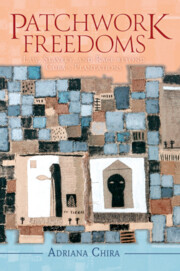Book contents
- Patchwork Freedoms
- Afro-Latin America
- Patchwork Freedoms
- Copyright page
- Dedication
- Contents
- Figures
- Maps
- Tables
- Acknowledgments
- Manuscript Sources and Abbreviations
- Note on Language and Region
- Maps
- Introduction
- 1 Unenclosed People, Unenclosed Lands
- 2 Foreign Implants
- 3 Keeping People Put
- 4 Manumission’s Legalities
- 5 “A Freedom with Further Bonds”
- 6 “Para levantar los negros y proclamar la República”
- Conclusion
- Book part
- Bibliography
- Index
2 - Foreign Implants
The Saint-Domingue Refugees and the Limits of Plantation Development, 1791–1808
Published online by Cambridge University Press: 10 February 2022
- Patchwork Freedoms
- Afro-Latin America
- Patchwork Freedoms
- Copyright page
- Dedication
- Contents
- Figures
- Maps
- Tables
- Acknowledgments
- Manuscript Sources and Abbreviations
- Note on Language and Region
- Maps
- Introduction
- 1 Unenclosed People, Unenclosed Lands
- 2 Foreign Implants
- 3 Keeping People Put
- 4 Manumission’s Legalities
- 5 “A Freedom with Further Bonds”
- 6 “Para levantar los negros y proclamar la República”
- Conclusion
- Book part
- Bibliography
- Index
Summary
Between 1791 and 1803, Santiago witnessed the arrival of more than 18,000 refugees who left neighboring Saint-Domingue in the midst of an antislavery revolution. Some among them were planter elites who wanted to recreate the plantation society that they had left. But they reached Santiago at a time when the free population of African descent had created a social and political space for themselves through alliances with a small group of political elites in Santiago. It was the combination of such alliances, marronage, and the Iberian sovereignty crisis that helped them contain the Saint-Domingue refugees’ plantation dreams. Already in the 1790s, prominent figures, such as the local bishop, complained that a plantation-based economy had a distinctly foreign quality within Santiago and that it was likely to cause social conflict. That sense was only amplified by actions undertaken by the popular sectors around 1808. Trailing in the Saint-Domingue refugees’ wake was also a new kind of rights talk to which enslaved and free people of color in Santiago were very attentive. In eastern Cuba, free people of color grafted this new talk onto Spanish legal traditions.
Keywords
- Type
- Chapter
- Information
- Patchwork FreedomsLaw, Slavery, and Race beyond Cuba's Plantations, pp. 66 - 104Publisher: Cambridge University PressPrint publication year: 2022
- 1
- Cited by



